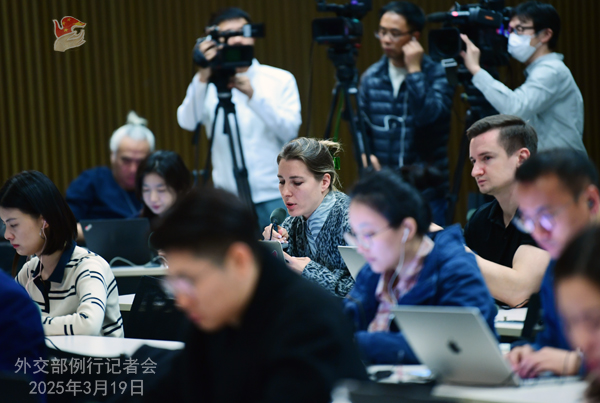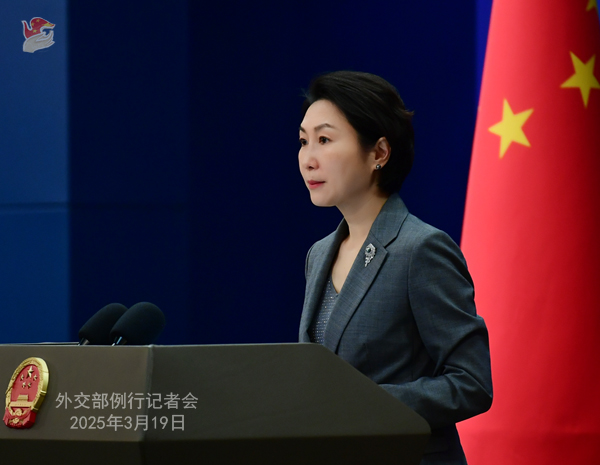

China News Service: The U.S. announced expanded visa restriction policy targeting Cuba’s global medical missions, labeling them “forced labor,” while also threatening visa restrictions for current or former Cuban government officials, third-country officials and their immediate family. Recently, CARICOM foreign ministers expressed concerns over the policy when meeting with U.S. Special Envoy for Latin America in Washington D.C. and several leaders from Caribbean states also criticized this policy. What is China’s comment?
Mao Ning: I noted that the director of the Central Unit for Medical Cooperation of Cuba Dr. Michael Cabrera Laza said that, during the past 60-plus years, particularly during the COVID-19 pandemic, Cuba, while overcoming its own difficulties, sent over 600,000 medical personnel to over 60 countries, provided medical services for over 230 million people and performed over 17 million operations and surgeries, which saved the lives of more than 12 million people. Cuba’s global medical missions have been welcomed by the governments and people of Caribbean states.
The false narrative of “forced labor” has become a perfect excuse and hegemonic tool for the U.S. to suppress other countries. Relevant measures of the U.S. is an extension and escalation of its over-60-year sanctions and blockade on Cuba. China opposes coercive diplomacy and urges the U.S. to immediately stop the blockade and sanctions on Cuba in any names and to remove Cuba from the list of State Sponsors of Terrorism, do more things that help improve relations with Cuba and deliver tangibly for the Caribbean states.
RIA Novosti: On March 18, Russian President Vladimir Putin had a telephone conversation with U.S. President Donald Trump, with a focus on the normalization of Russia-U.S. relations and the situation in Ukraine. What is China’s comment? How much will this help resolve the Ukraine crisis?
Mao Ning: We’ve noted the reports. China has advocated since day one that the Ukraine crisis should be resolved through dialogue and negotiation. We welcome all efforts towards ceasefire and believe that talks are a necessary step in order to achieve peace.
Swedish Television: Chinese companies’ petroleum exploration and mining on Russia-occupied territory of Ukraine violates international humanitarian law, as well as provisions in the Fourth Geneva Convention in 1949 and UNCLOS. What’s the Foreign Ministry’s view?
Mao Ning: I’m not familiar with the specifics you mentioned. China’s position on the Ukraine issue is consistent and clear. The four principles laid out by President Xi Jinping form China’s fundamental approach in handling this issue.

Kyodo News: It’s reported that during his visit to the U.S. in February, Japanese Prime Minister Shigeru Ishiba jointly announced with U.S. President Donald Trump that the U.S. and Japan will oppose any attempts by the Chinese government to unilaterally change the status quo in the Taiwan Strait by force or coercion. Also early in February, a Japanese Maritime Self-Defense Force vessel sailed through the Taiwan Strait. Against such background, with what kind of resolve is Foreign Minister Wang Yi set to visit Japan? How will China and Japan bridge differences in their talks?
Mao Ning: Foreign Minister Wang Yi will travel to Japan to attend the 11th China-Japan-ROK Trilateral Foreign Ministers’ Meeting and co-chair the Sixth China-Japan High-Level Economic Dialogue. We made the announcement and shared relevant information yesterday, which you may refer to.
The Taiwan question is China’s internal affair and brooks no external inference. Japan bears historical responsibilities to the Chinese people for its colonial rule over Taiwan. It must act with extra prudence on this issue. As for the China-related negative moves of Japan you mentioned, China lodged serious protests with Japan immediately after those moves.
The China-Japan relationship is at a crucial juncture for improvement and development. We hope Japan will act on its pledges of comprehensively advancing the China-Japan strategic relationship of mutual benefit and building a constructive and stable China-Japan relationship fit for the new era, and we hope it will remove obstacles against the improvement and development of the bilateral relations.
AFP: The government of Kiribati said this week that it is discussing a deep sea mining partnership with China. Can the Foreign Ministry confirm this and provide any details on what could be agreed?
Mao Ning: China engages in practical deep-sea cooperation with relevant countries in accordance with international law and under the principle of mutual benefit and win-win results. The cooperation between China and Kiribati is also carried out on the basis of mutual respect, equal consultation, openness and inclusiveness.
Reuters: According to the Thai government, a delegation from Thailand has arrived in Xinjiang to meet a group of Uyghurs who were deported from Thailand last month. Can you confirm if the delegation has arrived in Xinjiang? Where are those Uyghurs currently? And how will they resume their lives in China?
Mao Ning: I’d refer you to competent authorities for the specifics. On the repatriation, China has shared information on multiple occasions. It is the normal law enforcement cooperation between China and Thailand, and is in line with the laws of the two countries, international law and international practice. The lawful rights of relevant persons are fully protected.
Kyodo News: This year marks the 80th anniversary of the victory of the Chinese people’s war of resistance against Japanese aggression. Some analysis in Japan believed that since September 3 this year, the Chinese government will adopt a harder line toward Japan on the diplomatic front. What’s your comment?
Mao Ning: This year marks the 80th anniversary of the victory of the Chinese people’s war of resistance against Japanese aggression and the world anti-fascist war. Japan should be responsible for the history, honor its words and commitments of facing squarely and reflecting on the history of aggression, and follow the path of peaceful development. Only by doing this can Japan earn the trust of its Asian neighbors and the international community. We hope that Japan can work with us in the same direction, and uphold the principles of facing up to history and opening up the future to advance China-Japan relations in a sound and stable way.

http://zw.china-embassy.gov.cn/eng/